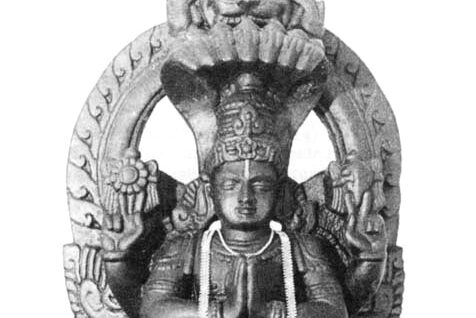
The following keynote was presented at the annual BAPS Swaminarayan Sanstha Women’s Conference in Robbinsville, NJ on Saturday, April 21, 2018.
Jai Swāminārāyan. What an honor it is to be here today. I’m reminded of my last visit to Robbinsville, at least in an official capacity, when pujya Pramukh Swami Maharaj showered all of us at the Hindu American Foundation with his āshirvād. To see the thousands of bhaktas who had come from near and far to catch a mere glimpse of him, allowed even me, someone not from within the Swāminārāyan fold, to witness living, breathing bhakti.
Thank you also for the personal attention so many of my sisters have offered me here today. You bring a distinctly feminine grace to pujya Swamishri’s motto — In the joy of others lies our own — and to the great Hindu tradition of atithi devo, or in our case, atithi devi, bhavah. The reputation of radical hospitality, which precedes BAPS Swāminārayān Santhsā clearly rests on your shoulders and in each of your hands.
I’d like everyone to turn to their right and left. Look at the sister next to you, smile, and say Namaste. Namaste. Nama – as – te. Only three syllables. Just one simple word. But it’s a word that has the power to unite — to unite us as nations, unite us as people, and most importantly, to unite our heads, hearts, and hands. Literally, namaste means, “The Divine within me bows to the same Divine within you.” But we take it for granted — it’s a mere greeting, almost a reflex. But if we pause to really understand it and imbibe it’s meaning in our every thought, word, and action, this one word encompasses the essential teachings of Hinduism — teachings of respect and compassion, truth and justice, self-control and selfless service.
But understanding alone doesn’t lead to experience, just as simply doing or going through the motions doesn’t lend itself to true understanding. Sri Krishna thankfully outlines four paths in the Bhagavad Gita — karma, bhakti gnāna, and dhyāna — to guide us to experience the happiness that arises out of fostering unity within us, which in turn enables the fostering of unity around us.
Virtually every guru from time immemorial has taught us that while we may tend towards one of these four paths based on our individual gunas or personality type or at different stages in our life, none can be tread in isolation. Each path is incomplete without the support of the other — just like the different parts of our Selves make us whole — our body, our emotions, our intellect, and our awareness — make us us. So, Karma without bhakti and gnāna can easily veer into selfishness. Bhakti without gnāna and dhyāna may manifest as blind or transactional faith. Gnāna without karma or bhakti allows our egos to inflate. The permutations are many, and every result takes us further and further away from being whole and happy.
So how do we live out Namaste? How do we think and act in a way that promotes unity or what Mahatma Gandhi so brilliantly described as being in a state when “what you think, what you say, and what you do are in complete harmony”? We already have the road in the form of yoga. All we need is to follow our map of directions.
What are those directions or values? Let’s just look at a few, and start with ahimsa. Most here are likely vegetarian. Some of us may even eat only local and recycle. All of these are our near daily acts of non-harming and living in unity with Mother Nature and her creatures. But what about being non-harming in our thoughts and words to those around us and even ourselves? Do we recognize and respect the Divine in the road-raged driver who cuts us off during rush hour traffic? Could we say, “Hā momiji,” when our mother-in-law asks us to do something that we don’t really feel like doing, but wouldn’t be harmed if we obliged. Do we beat ourselves up with guilt when one of the many balls most women today have in the air at once, falls? Ahimsa asks us to be non-harmful in all that floats through our minds, and sometimes comes out of our mouths and hands.
Satya. As a stand-alone value, the truth can hurt — really hurt. Case in point: “Do these pants make me look fat?” While “yes” may be the honest answer, Hindu gurus have advised that truth must always be served on a platter of kindness. So how can we communicate truthfully but also with respect and compassion? Perhaps being present and open in all of our conversations is one way. As one of my favorite swamis from Chinmaya Mission Trinidad shared during a talk, “God gave you two ears and one mouth, so listen more and speak less.” I confess that I’ve suffered from foot-in-mouth syndrome, giving unsolicited advice as a result of simply talking too much or blurting out something rude because I made assumptions about what was being said. So following Swamiji’s advice serves as a reminder to foster more genuine and loving relationships, be it as a daughter, sister, wife, mother, professional, or friend.
Asteya literally is non-stealing, but that’s rather simplistic and perhaps too easy for most of us who are law-abiding members of our respective communities. So we have to dig deeper and apply more expansively. When we’re at our jobs or spending time with our families, how much time do we spend doing something else? Online shopping? Texting a friend? Checking out Facebook or Instagram? We all do it – but it’s a form of stealing from not only the company or person in front of you, but ourselves of the beautiful opportunity to be present in the moment.
Brahmachārya or self-restraint and moderation is another important guideline. We all have the things towards which our willpower is strong, but we also have areas that are weaker. It may be food, or gossip, or jewelry. For me, sure I’m guilty of some of those vices, but an area I could really work on is my control of thoughts, especially when trying to navigate the swinging pendulum of life’s highs and lows. In times of stress, my thoughts, as if laced up with a pair of running shoes, sprint back and forth between woulda-coulda-shoulda and what-if. Learning the art of not letting thoughts control our ability to have faith in God and be present through mindfulness and meditation can help in our moments of excess and disconnectedness.
Apārigraha — In an age where the latest sāri or chuddidār is just a mouse-click away, abstention from greed, or in more modern terms, letting go of the need for “stuff” is so relevant. I have to admit that I actually have my credit card number memorized because of online shopping. I also have to sadly admit that I have not been able to memorize, thanks to caller ID and a cell phone, my own sister’s phone number — and that too, despite talking to her almost every day. How many of you can relate? When so many in the world go to sleep hungry one too many nights, can we live more simply and offer our prosperity and fortune to others. Choose to follow the wise words of Mahatma Gandhi, who said, “I live simply so that others may simply live.”
These are just a few of the values offered by our shāstra. Others, like saucha, santosh, tapa, svādhyāya, and Ishvara pranidhāna are equally important. The beauty is, that when each of these is practiced with consistency and awareness, we are purified from within, our thoughts, words, and deeds aligned, and we’re better able to imbibe and exude the Divinity that is us. And when we can be divine, we can better see the divine in all that is around us, which is what living out our simple little greeting, namaste, is all about.








































